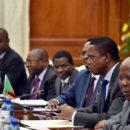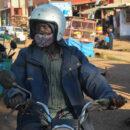Homosexuality and the battle for Africa’s soul


By Mark Gevisser* – 07/03/2011
This piece was first published in the Mail and Guardian in June 2010
“These boys committed a crime against our culture, our religion and our laws,” said the Malawian president Bingu wa Mutharika over the weekend as he pardoned Steven Monjeza and Tiwonge Chimbalanga from their sentence of 14 years hard labour. Shortly after a meeting with the UN General Secretary Ban Ki-Moon, he claimed he was exercising the pardon “on humanitarian grounds”. If he were more truthful, he would have said it was on diplomatic, or expedient grounds: his country is almost entirely dependent on foreign aid, and the pressure on him was intense.
Meanwhile, Monjeza and Chimbalanga will no longer see each other now that they are free, according to reports. How could any young couple bear the pressure, and run the risk of recidivism and rearrest? Both have been “returned” to their home communities where their families, it seems, will take up the role of punishing them where the state left off. Two lives, at least, have been ruined, and as the terrible episode draws to a close, it is worth reflecting on why there appears to be a wave of state-sanctioned homophobia across the continent at the moment, and what those of us –African or not – committed to human rights might do about it.
The recent international pressure on Malawi is reminiscent of that on Uganda last year: as a consequence, the country’s president, Yoweri Museveni, intervened to prevent the inclusion of a clause mandating the death penalty in certain instances. On a smaller scale, something similar happened in Rwanda at the end of last year: activists caught wind of a proposal to criminalise homosexuality, and mounted a rapid-fire global campaign, forcing Paul Kagame’s government to announce that it had no intention intervening in the private lives of its citizens.
Such actions might be in the best tradition of international solidarity, reminiscent of the kind of global action that played its part in bringing down apartheid. But given the politics of aid in Africa, they have consequences. Both Museveni and Kagame find themselves accused of being the stooges to their donors; in the latter case, the country’s evangelical churches are seeking constitutional relief, and one influential pastor is reported as saying, recently, “leta yafashwe kungufu” – Kinyarwanda for “the state was raped by the donor community”.
Last year, the gay Arab-American academic Joseph Massad wrote a controversial paper accusing gay funders and activists of becoming a neo-colonial “Gay International”, and of provoking unneccesary cultural conflict in the Arab world by imposing their Western “orientalist” definitions of sexual identity on societies they deeply misunderstood. Such provocations, he wrote, land up making things worse, rather than better, for the very people they are trying to assist, because of the backlash against them. Do Massad’s arguments hold any water in sub-Saharan Africa? Would homosexuals in Malawi or Uganda be any better off had the “Gay International” (perhaps best personified in the person of the veteran British human rights campaigner Peter Tatchell) not been activated?
Homosexuality is – as has often been noted – illegal in 38 out of Africa’s 53 sovereign states. In most instances, however, this is merely a hangover from the colonial British penal code, which criminalised sodomy for the first time in Africa, and is usually ignored. Homosexuality is certainly is not a western import, but both legislated homophobia and gay identity are. Particularly for younger urban people, sexuality has become a matter of identity (“I am gay”) rather than mere practise (“I sleep with men”); an overt insistence on equality rather than a covert satisfying of desire, accomodated by social norms and traditions.
The result has been social crisis. Before the Malawi case, there was organised mob violence against gay men and AIDS workers in Kenya earlier this year, and a protracted crackdown against homosexuals in Senegal; when gay men fled to Gambia last year, the president told them to leave or face decapitation. Recently, in Zimbabwe – where the state has been viciously homophobic for over a decade – two gay activists were arrested and detained for criticising the anti-gay policies of Robert Mugabe, and in several other countries new anti-gay legislation is in the offing.
Africa, of course, is neither homogenous nor unique. Much of what is being faced by gay Africans today has been experienced in other parts of the world, including the west. Nonetheless, there is something undeniably specific about the loathing that has been activated on the continent at present, as couples such Monjeza and Chimbalanga challenge age-old gender roles in societies struggling to maintain their integrity, and to define their places in a modern, globalised world.
The language of Sodom and a fear of the wrath of God might be a language that Africans have learned from western Christian missionaries, but it strikes a deep chord in insulated societies, such as those of Malawi and Uganda, where there is much fear about a modern world that is pulling people inexorably away from their traditional social units, and where life has often become harder for ordinary people. The digital revolution plays no small part in this: thanks to satellite TV, middle-class Africans can channel-switch effortlessly between “Will and Grace” and Wahaabi tirades against the decadent homosexual west. Tabloid newspapers sniff out marriage ceremonies to be performed by young men who have learned of such possibilities through their own exposure to the global media – even though there is no evidence that the Malawian couple were in any way acting beyond their own impulses. Indeed, it is not even correct to call them a “gay” couple: Chimbalanga self-identifies as female.
Nonetheless, because Malawian society does not accept Chimbalanga as a woman, their engagement ceremony was read as the equivalent of a “gay marriage”, and the arrests of the two were provoked by sensationalist tabloid-style coverage. The Nation, the Malawian newspaper that caught wind of the story and broke it, put it bluntly: this was “the first recorded public activity for homosexuals in the country”. The anti-gay legislation had never been used in Malawi, but given that readers were now reminded that the practise of homosexuality carried a sentence of upto 14 years, the police felt compelled to act.
The Kenyan violence began simililarly: a gay Kenyan couple was legally married in London; a Kenyan newspaper reported on it, which triggered a spate of homophobic sensational coverage in the country’s mass media, which made local radio stations in Mombasa eager to report on the rumour of a gay wedding, which led to anti-gay vigilantism, brutal violence, and the arrest of six allegedly gay men earlier this year.
Meanwhile, as Islam blooms in both East and West Africa, Christian clerics use homophobia as a weapon in the battle for souls, while conservative Christians from the west have found in Africa the numbers needed to counter the liberalisation of their churches back home. This has been most evident, for example, in the way the Nigerian Anglican church has become a bulwark against the ordination of gay priests and the sanctification of same-sex marriages.
And so, while Western human rights organisations fund the development of gay organisations in places like Uganda, conservative American Christian organisations in these countries have been mobilising politicians in the same country to adopt extreme anti-gay legislation. There is much irony, for example, in the way the pastor quoted above blames the donors for raping Rwanda, when his very theology has its roots in evangelical America, and when he and his co-religionists have been exposed to homophobia through the missionary activity of right-wing American churches. These churches, and high-profile individuals, have provided both the mobilization and the theological underpinnings for state-sponsored homophobia, and it is a matter of record that the Ugandan campaign to impose the death penalty for homosexuality in certain cases arose out of interaction with Americans such as Rick Warren and Scott Lively.
The context to these “culture wars” is the AIDS epidemic. Conservative American evangelicals gained a foothold in some African countries thanks to the policies of George W. Bush’s President’s Emergency Plan for AIDS Relief (PEPFAR), which prioritised “faith-based” HIV-programming that prioritised the preaching of abstinence over the distribution of condoms. This not only gave the Christian right entrée into countries such as Uganda; it empowered an entire generation of conservative Christian organisations and individuals in East Africa.
Meanwhile, the largely-liberal establishment aid agencies – particularly those from Northern Europe – strongly pushed an agenda of gay equality. This was not just because of the issue of equality, but because of the growing evidence that one of the major vectors of HIV-transmission in African societies is “men who sleep with men” (MSMs) : precisely those men who do not call themselves “gay” but who practise homosexual sex. To reach these men, state-funded programmes such as the Kenyan Medical Research Institute (KEMRI) began focusing on MSMs. It is not coincidental that the victims of the anti-gay violence in Kenya were AIDS workers, who provided services to homosexual clients at KEMRI in Mombasa.
The AIDS epidemic has only heightened many African countries’ dependence on the West, and in this context, there has been a new impetus to fight the “neo-colonialism” of development aid: the Zambian economist Dambisa Moyo argues in her bestselling Dead Aid, for example, that dependency on western aid is killing African society, and that the plug must be pulled in five years. While many of the precepts of this movement might be correct, the reality is that the withdrawal of development aid from Africa at this point – particularly given the AIDS epidemic – would be catastrophic.
And so, as many Africans become increasingly uncomfortable with their countries’ dependence on the West, they look to find a place to put their pride: they might be poor, but at least they have values! In all the world’s global indicators of wellbeing, they can at least lead one: morality. With ineffective states and moribund economies, what better way to maintain popular support than through the scapegoating of an unpopular minority in the name of a battle against western decadence?
In the face of this, what choice does the international community have, but to exert such pressure in countries like Malawi and Uganda ? Nonetheless, in the way it confirms the canard of human rights as a “western agenda”, and in the way it perpetuates the very sense of powerlessness that provokes homophobia in the first place, the pressure alone is clearly not a viable long-term solution.
Perhaps the experience of South Africa provides something of an antidote to this vicious cycle. Here, despite the horrific phenomenon of “corrective rape” against black lesbians in townships, the African National Congress has championed sexual equality, and legalised same-sex marriage; even the country’s current president, Jacob Zuma, a man with a history of homophobic statements, felt compelled to condemn the Malawian sentence last week.
This is, in part, the result of a uniquely heterogenous and industrialised society – and a non-homophobic church, thanks to Bishop Desmond Tutu and his generation of liberation theologians. But it is also the result of a highly effective campaign by human rights activists – like Tutu himself – who worked to disarm political African homophobia by folding gay rights into a broader understanding of human rights and post-colonial development.
The winning argument went thus: to discriminate against homosexuals for an inherent immutable genetic fact is tantamount to discriminating against black people for the same reason. Such logic may hold greater purchase in South Africa, where the memory of racial discrimination is still fresh, than in countries like Kenya or Rwanda, where other sectoral battles have become predominant. Still, even in these countries – where one might be stigmatised because of one’s tribe, or religion rather than race– invocations to “equality” and “human rights” have a particular ring to African ears.
The South African process also proved the value of incrementalism: only after the constitutional equality clause was written and tested, and many other rights were gained, did the the issue of same-sex marriage come before the courts. Even then, the Constitutional Court was inspired in its decision to compel Parliament to change the law rather than changing it unilaterally itself: Albie Sachs, who wrote the decision, understood that for social change to happen on so profoundly divisive an issue, in the South African process, particularly Until a significant number of African leaders join Bishop Tutu in the fight against homophobia by invoking the continent’s own experience of discrimination, there will be no imminent end in sight to the hardship of people such as the Malawian couple released over the weekend.
Meanwhile, as subjects become citizens in African societies thanks to the deepening of civil society and the spread of digital technology, they claim their space, and they also discover the world beyond the narrow confines of their communities. They do this with intent – as in the case of brave activists in Uganda or Malawi – or simply out of the natural inclination towards freedom and self-definition, as in the case of Monjeza and Chimbalanga. Tough as it might be for them, future generations will thank them.
*Mark Gevisser is a South African writer and journalist – author of Thabo Mbeki: The Dream Deferred. He recently appeared at the RAS reading from his Granta piece Edenvale.
You might also be interested in…
Marc Epprecht – Heterosexual Africa? – Notes from the struggle for sexual rights





